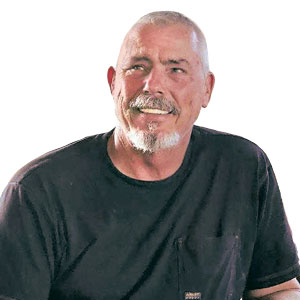
Marlin Voss
This month, we check in with Marlin Voss. This former oil rig worker-turned-landscaper-turned pest management professional has built his Carlsbad, N.M.-based business largely on offering bare ground treatments on oil rig fields. Voss and his wife, Pearlene, founded Action Pest and Weed Management in 2018 and have 11 employees.
1. Marlin, how did you get into pest control?
I started doing landscaping and got started in weed spraying in the oil fields. I learned it was seasonal, so I tested for the structural pest control license around 2010 and here we are, serving New Mexico and parts of Texas. We’re about 95 percent commercial, offering general pest control, termite and bed bug services, but I’d estimate that about 20 percent of those accounts consist of doing bare-ground weed control for oil fields and other accounts.
2. What is meant by “bare-ground weed control”?
It’s long-term pre-emergent control, stopping unwanted vegetation around oil field locations, tank batteries, right of ways, etc. It’s also good pest control, as it takes away food and harborage for insects and rodents — and thus rattlesnakes. Snake bites are a big concern for oil rig companies, and we lower their risk of liability and injury by removing the brush where snakes and their prey can hide.
3. What is a typical treatment like for your team?
We usually send two technicians per truck, so no one is ever working alone. Our company has GPS tracking on its vehicles and good cell phone coverage, but we’re often working in remote areas. For big accounts, we’ll have two trucks with one tech in each. Each truck is equipped with a 500-gallon spray rig, with a hose rig for tight spaces. Sometimes we’re asked to spray down the entire space; other times we’re applying a 10-foot barrier around pipelines, for example. It’s usually an annual treatment, and the season lasts from February through October, depending on the weather. My technicians are cross trained to help with other accounts in the winter, so there are no seasonal layoffs.
4. There are only so many oil fields, of course. Are there other accounts for which this strategy is useful?
There are quite a few, actually. We service a lot of hospitals, windmills, solar panel areas and transmission lines, for example. We also perform bare-ground treatment on residential accounts where the landscaping is xeriscaping, meaning there are rocks and low-irrigation plantings instead of grass. In our market, we average about 16 inches of rain a year — but even an inch of rain can make weeds pop up. For our residential accounts, we offer annual, semi-annual and quarterly options.
5. What recommendations do you have for pest control firms looking to get into bare-ground weed and pest control?
Scope out good candidate accounts in your area, then reach out to their head supervisors of maintenance or landscaping. In this space, remember that “no” often means “not right now,” so don’t be afraid to follow up year after year.
Networking is important: We landed one account because I treated a fracking company’s wasp nest problem, and the manager liked my work. I told him I had been trying to sell our bare-ground services to his company for six years — and he said consider us hired. They’ve been a stellar account ever since.
My last piece of advice before you dive in is that you often need a master service agreement (MSA) to work at these accounts, and those aren’t easy to come by because of all the negotiating and level of detail involved. To get one, you also need to have a lot of insurance coverage — like adding another “zero” to the usual minimum plan’s dollar amount. But if you have that, and build good relationships and recurring revenue, it’s a great service to offer.
Marlin is a class act. One of the very best!